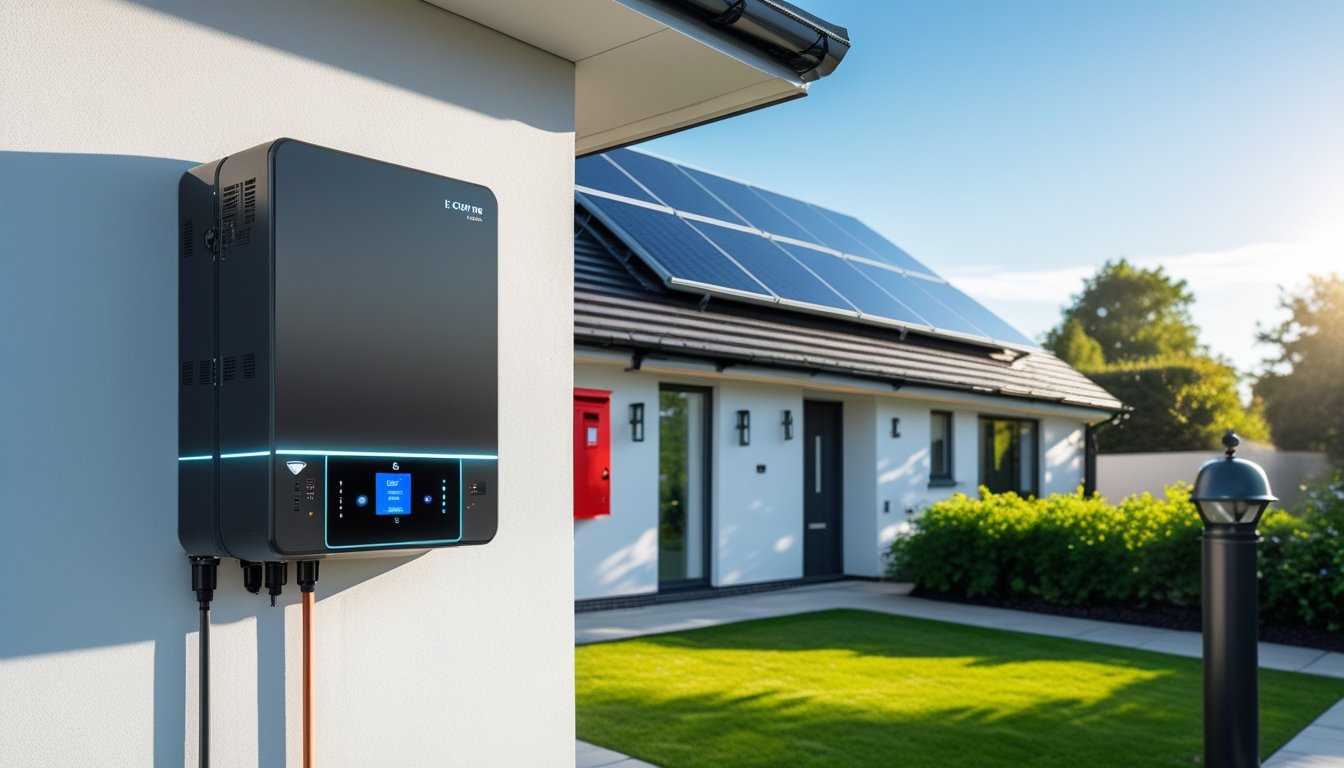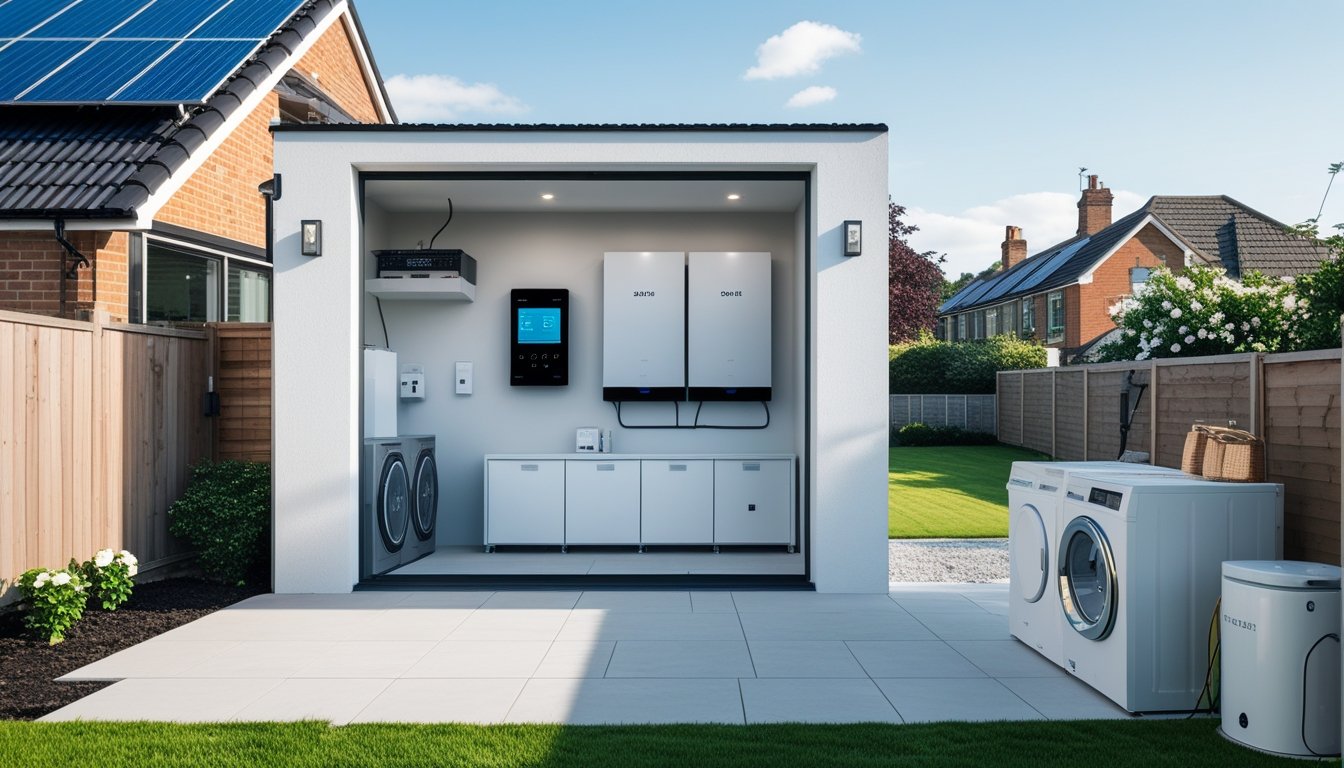Late updated: 20 Sep 2025 15:09
Written by: Eleanor Hartman
Innovative Home Battery Technologies In The UK: Transforming Energy Storage
The landscape of home battery technology in the UK is rapidly evolving, driven by groundbreaking innovations and a growing commitment to renewable energy solutions. As homes become more reliant on smart energy systems, British companies are at the forefront of developing efficient and sustainable batteries. These advancements promise a new era where energy storage is not only accessible but also environmentally friendly.

Our exploration into this subject reveals that recent introductions like sodium-ion and polymer-based batteries are paving the way for safer and greener energy solutions. These novel alternatives challenge the dominance of traditional lithium-ion batteries and align with eco-conscious values by minimising environmental impact through sustainable practices. As a nation, our pursuit of energy independence and sustainability fuels these technological strides.
With government support echoing the public's demand for cleaner energy, we witness greater integration of innovative battery technologies into domestic spaces. As these technologies progress, they have the potential to transform the way we consume and store energy, offering enhanced efficiency, reduced costs, and improved energy security. The UK stands at the cusp of a battery revolution, one that invites us all to rethink our approach to energy usage and sustainability.
Key Takeaways
- Sodium-ion and polymer-based batteries offer safer and greener alternatives.
- Innovations in the UK focus on energy independence and sustainability.
- Government backing accelerates the integration of new battery technologies.
Key Drivers and Innovations in Home Battery Technologies

In the UK, home battery technology is becoming increasingly essential for energy storage and management. Innovations in battery technology are leading the charge, with key players contributing to the development of safer, more efficient, and environmentally sustainable solutions.
Latest Developments in Battery Technology
Recent advances have revolutionised battery performance. Lithium-ion batteries, renowned for their high energy density, are being surpassed by next-generation offerings. Companies such as Nyobolt and Nexeon are pioneering in creating faster-charging and longer-lasting alternatives. We are also seeing increased efforts to use materials that extend battery lifecycle and reduce environmental impact.
Moreover, Addionics is making strides by innovating new battery structures, enhancing performance significantly. These innovations promise not only to boost capacity but also enhance safety and reduce costs significantly over time.
Home Energy Storage Systems: Types and Performance
With the growing need for reliable energy solutions, various home energy storage systems have emerged. Lead-acid batteries, once popular, are gradually being replaced due to their lower capacity and shorter lifespan. Today, homeowners opt for lithium-ion batteries, praised for superior energy efficiency and longevity.
Another promising development is the incorporation of renewable energy sources, such as solar panels, which seamlessly integrate with battery systems. This integration enhances energy independence and sustainability. Each system comes with its unique set of advantages, allowing us to choose based on priorities such as cost-effectiveness, durability, and capacity.
Major UK Companies and Start-Ups Shaping the Sector
Several UK-based companies are leading the push towards widespread adoption of advanced home battery technologies. Nyobolt is at the forefront, offering rapid charging solutions that cater to high-energy demands. Nexeon works on improving anodes to extend battery life and efficiency.
We're also witnessing innovative contributions from rising start-ups like Addionics, focusing on next-generation structural designs. These companies are laying the foundation for a more sustainable future, driving advancements in both battery capacity and performance. Their contributions not only solve present challenges but also pave the way for future breakthroughs in energy storage solutions.
Integrating Innovation for Sustainability and Renewable Energy in the UK

Our exploration of renewable energy focuses on integrating advanced battery technologies with solar panels, leveraging government support, and embracing trends in recycling. These elements contribute significantly to sustainable energy solutions throughout the UK.
Battery Integration with Solar Panels and Renewable Energy
By aligning home batteries with solar panels, we enhance energy storage capabilities, thus maximising renewable energy utilisation. Integrating batteries with residential solar systems allows households to store excess energy during sunny days and use it when solar generation is low, reducing reliance on the grid.
This synergy is crucial in maintaining energy efficiency and lowering electricity bills. The application of batteries extends beyond homes, supporting larger-scale renewable projects by ensuring continuous energy supply and contributing to a more resilient grid system.
Government Initiatives, Research Centres, and Funding
UK government initiatives, such as the Innovate UK and the Faraday Battery Challenge, play pivotal roles in driving battery development and integration with renewable energy. The UK Battery Industrialisation Centre (UKBIC) supports advancements by providing resources and expertise. These programs encourage collaboration among companies, researchers, and developers.
Significant funding, including the newly announced US$621 million investment, is directed towards sustainable battery technologies. This financial support accelerates research and manufacturing efforts, facilitating the widespread adoption of advanced energy solutions across various sectors.
Emerging Trends: Battery Recycling and Circular Economy
The rise of battery recycling and the move towards a circular economy are transforming our approach to sustainability. Altilium and other companies focus on reclaiming materials from used batteries to reduce environmental impacts. By processing and reusing battery components, we decrease the demand for raw materials and minimise waste.
Adopting a circular approach in battery management not only supports sustainability goals but also reduces costs for manufacturers and consumers. It is a significant step forward in sustainable practices, making battery technologies more viable for both automotive and residential applications.
Frequently Asked Questions
In this segment, we address the most common queries about home battery systems in the UK. We explore new advancements, integration with renewables, economic considerations, and more.
What are the latest advancements in domestic energy storage solutions within the United Kingdom?
The UK market has seen advances, such as lithium-iron phosphate batteries known for their safety and longevity. Moreover, modular systems now allow homeowners to expand capacity as needed.
How are UK homeowners integrating renewable energy sources with home battery systems?
Many UK homeowners combine solar panels with battery storage, capturing excess energy to be used when solar generation is low. This setup maximises the utility of renewable sources.
What government incentives are currently available for installing a home battery system in the UK?
The UK government offers the Smart Export Guarantee (SEG) programme, where households are compensated for exporting unused energy back to the grid. Various local schemes may also incentivise installations.
Which home battery systems offer the best value for money on the UK market?
Brands like Boxergy and AlphaESS provide competitive solutions. Evaluating cost, capacity, and life expectancy helps determine the best value options in the market.
How do UK home battery technologies compare in terms of efficiency and reliability?
Home battery systems in the UK have improved in efficiency and reliability, with options like LiFePO4 batteries standing out for their performance and safety. These developments enhance user confidence.
What is the environmental impact of using home battery systems in the UK?
Using home battery systems reduces dependence on fossil fuels, cutting down carbon emissions. However, the production and disposal of batteries need to be managed to minimise ecological impact.